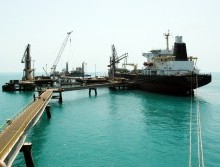
Sea trade is one reason we’re worried about Egypt. Oil Tanker. Illustrative. Photo Courtesy of U.S. Navy. Photo by Mass Communication 2nd Class Nathan Schaeffer
This past Saturday the bloodshed in Egypt over their political crisis continued: at least 38 were killed and more than 200 injured—and those are the low numbers given by the government. According to a report from Ahram Online, the Muslim Brotherhood is claiming 120 were killed and 4,500 injured. The numbers are staggering and disturbing.
We’re weeks after the Egyptian military deposed former President and Muslim Brotherhood member Mohammed Morsi from power. But while millions protested Morsi to have him leave, thousands have protested against his removal and the clashes and violence haven’t ceased.
The opposition backing Morsi is even claiming that police and government-sponsored “thugs” opened fire on protesters this past weekend. And if you think this is just another tragic run of violence in the Middle East, think again.
Egypt is a critical country in the Middle East and the oil industry. Egypt has received billions of American dollars and millions of Euros in aid, including substantial military aid. In some ways, the US in directly funding the Egyptian army, which overthrew Morsi. Are you ok with that?
Furthermore, while Egypt is not a major player in the oil world, they control the Suez Canal—a vital waterway for oil shipping trade. They are, in a sense, the gatekeepers for Middle East oil.
Imagine if the one bridge is out—traffic would be a chaotic mess. That’s exactly why the oil companies are concerned about the Suez Canal, a sort of waterway bridge for ships. While it’s functioning fine for now, Egypt in disarray raises fears of issues at the Suez.
The Egyptian crisis caught Germany’s eye on Saturday. Foreign Minister Guido Westerwelle said in a press release that he is “very worried about the violence prevalent at demonstrations in Egypt, which has claimed a number of human lives.”
The statement said Westerwelle has “appealed to the Egyptian authorities to allow peaceful demonstrations and to do everything in their power to avoid further escalation,” noting that “the future of Egypt can only be built by dialogue not violence.”
(By Joshua Spurlock, www.themideastupdate.com, July 29, 2013)
